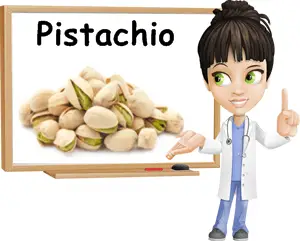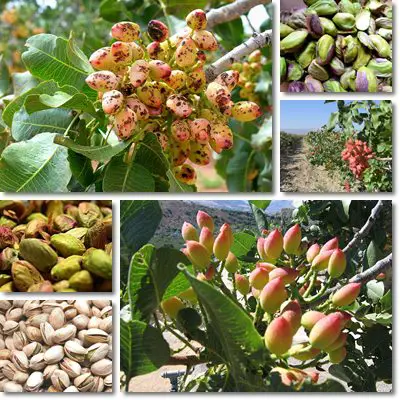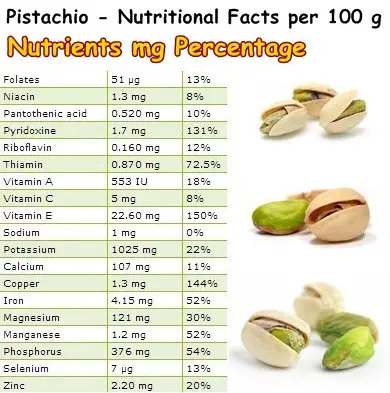The pistachio tree is a sun-loving plant which can thrive in the most arid place on earth: the desert.
The trees can withstand temperatures below 0°c and even up to 50°C.
Regular consumption of pistachios boasts several wonderful health benefits such as lower blood cholesterol levels and inflammation reduction. In addition to healthy essential fatty acids, pistachios contain more than generous amounts of dietary minerals and vitamins and it is this high concentration of nutrients that proves beneficial for human health.
Vitamins B1, B6, A and E as well as potassium, copper, iron, magnesium, manganese, phosphorus and zinc are all found in generous amounts in pistachio nuts. When unripe, pistachios resemble elongated, pointy, yellowish grapes. They slowly start to ripe and turn a pink-reddish color. As a ripe nut, the pistachio contains a savory, slightly oily kernel inside a hard, beautiful beige shell. In order to enjoy all the health benefits they have to offer, you have to eat pistachios fresh.

Roasted and salted nuts and seeds have a decreased health potential. While salt does give pistachios flavor and compliments their pleasant crunchy texture and mild (some would say bland) nutty taste, it is important to remember that a too high a intake of sodium is not healthy and a preference for salted foods can up sodium intake easily and lead to serious medical problems over time such as hypertension, fluid retention, weight gain and more.
Almost all nut and seed products are roasted and salted nowadays which is interesting because it’s the fresh, unprocessed products that have the most benefits. Nuts and seeds have by far the highest levels of essential vitamins and minerals out of all foods, but salting them takes away from the beneficial action. If you really wish to keep healthy, always choose unsalted sunflower seeds, hazelnuts or pistachios.
Is Eating Pistachios Healthy?
Eating pistachios comes with a wonderful set of health benefits. Only a handful of them provides important amounts of unsaturated fatty acids and vitamin E, contributing to lower blood lipids levels and, consequently, lowering LDL (bad) cholesterol levels. Pistachios are also relatively low in saturated fats (5.5 g), but should be consumed in limited amounts because they provide 45 g of fat overall and 562 kcal for every 100 g. Eating too many could easily lead to weight gain and related diseases.
Studies suggest that the seeds (yes, they are actually seeds) contain potent antioxidants which help counteract the side effects of oxidation in the body. Antioxidants not only have anti-aging effects and help us maintain our youthful appearance, but also offer protection against a variety of diseases brought on by free radical damage and subsequent inflammation. When consumed in limited amounts, as part of a balanced diet, pistachios contribute to lowering inflammation levels. According to research, high inflammation levels are known to cause a number of serious illnesses, cancer and cardiovascular disease included.

A handful of pistachios makes a truly healthy snack and a great way to help you keep you weight under control, as long as you don’t eat too much. Despite their high energetic value and fat content, pistachios, as well as all nuts varieties have a high fiber content: 10.3 g of fiber per 100 g of pistachios. This is more than 30% of the recommended daily intake for a day. As for its benefits, fiber limits the absorption of fats at the intestinal level and helps keep cholesterol levels within healthy limits. It also helps with weight management and provides digestive benefits, helping relieve constipation.
You might be interested : Are Pistachios Acidic?
The key is to eat wisely and moderately and you won’t ever have to worry about body weight problems. Phytosterols found in generous amounts in most plants, pistachios included, contribute to lower cholesterol levels as well. A regular, yet limited intake can have overall great benefits for cardiovascular health. Pistachios make a wonderful snack for both adults and children.
However, if you have never eaten them before, it is best to take an allergy test called a skin prick test to find out whether or not you are allergic to them. Nut allergies are one of the most common food allergies and can result in anaphylactic shock, hence the need to test for them before eating anything you could possibly be allergic to.

The seeds are also a rich source of unsaturated fatty acids and protein, providing over 36 g of unsaturated fats and 20.27 g of protein per 100 g. Essential fatty acids are required by the human body in order to function properly and play an important part in supporting cognitive functions such as memory, focus and learning. The amino acids that make up protein help synthesize neurotransmitters that regulate mood and thus help combat mood swings and promote clear thinking. Overall, pistachios are a great food for the brain.
Pistachios contain impressive amounts of several essential nutrients such as pyridoxine (1.7 mg), thiamine (0.870 mg), folic acid (51 mcg), pantothenic acid (0.520 mg), niacin (1.3 mg) and riboflavin (0.160 mg). All of these B vitamins are essential components in many enzymatic processes and support the distribution of energy throughout the body, preventing mental and physical fatigue. Moreover, the seeds have a high content of vitamin E (22.60 mg, over 150% of the recommended daily intake). Ladies, pay attention: vitamin E is what keeps your skin looking fresh, radiant and beautiful. The vitamin has an intensive moisturizing effect and helps skin cells better retain moisture for a hydrated and healthy appearance.
More important, pistachios are an incredible source of dietary minerals such as copper (1.3 mg), phosphorus (376 mg), iron (4.15 mg), manganese (1.2 mg), magnesium (121 mg), potassium (1025 mg), zinc (2.20 mg, selenium (7 mcg) and calcium (107 mg). A sufficient copper intake is a solution against premature hair graying. Iron prevents anemia and is good for pregnant women, restoring vitality and supporting circulation.
Manganese has a potent antioxidant action. Magnesium increases calcium absorption and supports muscle health. Potassium lowers high blood pressure and combats water retention. Zinc increases our immune system’s response to infections, boosting immunity. Selenium supports the activity of the thyroid gland and prevents hypothyroidism, while calcium contributes to strong, healthy bones.
Conclusion
Imagine you could enjoy all of these health benefits and many more. Eating pistachios every now and then, as part of an overall healthy and clean diet, can have great positive effects on your health, provided you avoid roasted and salted brands. Remember that pistachios and other seeds and nuts have incredibly high concentrations of vitamins and minerals, which greatly exceed the nutritional content of other foods.
